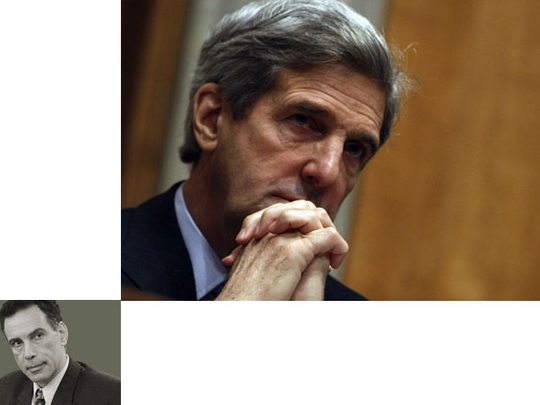
Despite three trips to the region and intensive attempts at restarting stalled Palestinian-Israeli peace negotiations, US Secretary of State John Kerry returned home disappointed. It must have been a sobering experience as could be deduced from his statement that he had a lot to learn.
Appearing before a congressional committee, Kerry said that despite the challenges, he is committed to pursue a peace settlement. US President Barack Obama said last week that there was a “window of opportunity” to revive the Middle East peace process. And probably for the first time publicly, Kerry warned that time was running out and that there may only be a year or two left to reach a peace agreement.
Public warnings that time is running out may be said to be one of the two most abiding features of the Middle East peace process. The other one is the fact that these warnings go unheeded. Even when the dire consequences implied in them came to pass, the various participants never sufficiently internalise the lessons from the unheeded warnings, and change their behaviour.
Take the example of the terms of reference for the peace process. Officially, they are founded on relevant UN Security Council resolutions, especially resolution 242, which reiterates the inadmissibility of the acquisition of territories by force (something which had already taken place during the establishment of the state of Israel in the 1948 war) and establishes the principle of land for peace. This requires Israel to return the land it acquired by force in the 1967 war — that is the West Bank, Gaza, occupied east Jerusalem and the Golan Heights — for recognition by, and peace with the Arab countries.
In reality, Israel is acting as if the terms of reference were exactly the opposite; dispossessing the Palestinians of their land, and actively expanding the colonial enterprise despite widespread international condemnation. In doing so, Israel not only violates international law, but also undermines the prospects of a peaceful settlement to which it claims to be earnestly committed.
This is belied not only by the Israeli strategy of creating facts on the ground, but also by candid admissions made by Israeli leaders. Consider the following statement made by Ariel Sharon. “Everybody has to move,” he once reportedly urged his compatriots, “run and grab as many hilltops as you can to enlarge the settlements [colonies], because everything we take now will stay ours.”
The Palestinian position also suffers from myriad contradictions. The Palestinian National Authority has privately made sweeping concessions and obtained nothing in return. In what has been described as “the biggest leak of confidential documents in the history of the Middle East conflict”, hundreds of confidential documents were obtained and published in January 2011 by Al-Jazeera network, and the Guardian. They show that Palestinian negotiators secretly accepted Israel’s annexation of practically all the colonies in occupied east Jerusalem, built in violation of international law.
The Palestine Papers also reveal that the Palestinian leaders were privately informed about Israel’s 2008-09 assault on Gaza. The papers also show that the leaders suggested swapping part of occupied east Jerusalem’s Arab neighbourhood of Shaikh Jarrah for land elsewhere.
The leaders went so far as to propose a joint Israeli-Palestinian committee to be in charge of holy sites in occupied Jerusalem’s Old City — a concession which Yasser Arafat adamantly refused at the cost of dooming the 2000 Camp David talks to failure. The chief Palestinian negotiator, Saeb Erekat, privately boasted that the Palestinians had thus offered Israel the biggest Jerusalem in history. Israeli leaders turned downed the offer.
Clearly, the Palestinian leadership is shown in the Palestine Papers to have had little regard for the official frame of reference based on international law and justice. Instead, they accepted the principles of balance of power in which the relationship of power between the parties determines the outcome of the negotiations. Since the relationship between Israelis and Palestinians is one of gross inequality (one is occupier, the other is occupied), the powerful should be expected to exploit, as Israeli leaders do; but the weaker party does not have to behave submissively, as the Palestinian leaders do.
Crucially, this begs the question: Why should Israeli leaders abide by the official terms of reference of international law and justice when their Palestinian interlocutors observe the implications of the balance of power-imminently more favourable to the Israelis? Washington’s uncritical support for the Israeli position and approach helps perpetuate the impasse in which the peace process is inextricably lodged.
Palestinian President Mahmoud Abbas reportedly told Kerry that the resumption of peace talks depended on Israel’s freezing of colony-building in the West Bank and occupied Jerusalem. He also told Kerry that Israeli Prime Minister Benjamin Netanyahu should present a map of the borders between Israel and Palestine.
Given the real terms of reference obtaining between the parties, an official of the Israeli government dismissively rejected the request out of hand.
The Netanyahu government went even further in an unusual demonstration of power over and control of the moribund peace process. After Kerry left, an anonymous official of the Israeli government rejected Kerry himself, and questioned his approach and knowledge. The senior Israeli official told the Israeli newspaper Haaretz that the American secretary’s strategy was unacceptable. “Kerry believes that he can bring about the solution, the treaty and the salvation,” the Israeli official said. “He thinks that the conflict is primarily over territory [...] and that is wrong.”
That is a bad omen. If Kerry is serious about a peaceful settlement of the Palestine conflict, which is clearly in the interest of the US, he should work on changing attitudes and misconceptions in Washington before heading to the Middle East again.
Adel Safty is Distinguished Professor Adjunct at the Siberian Academy of Public Administration, Russia. His new book, Might Over Right, is endorsed by Noam Chomsky.









